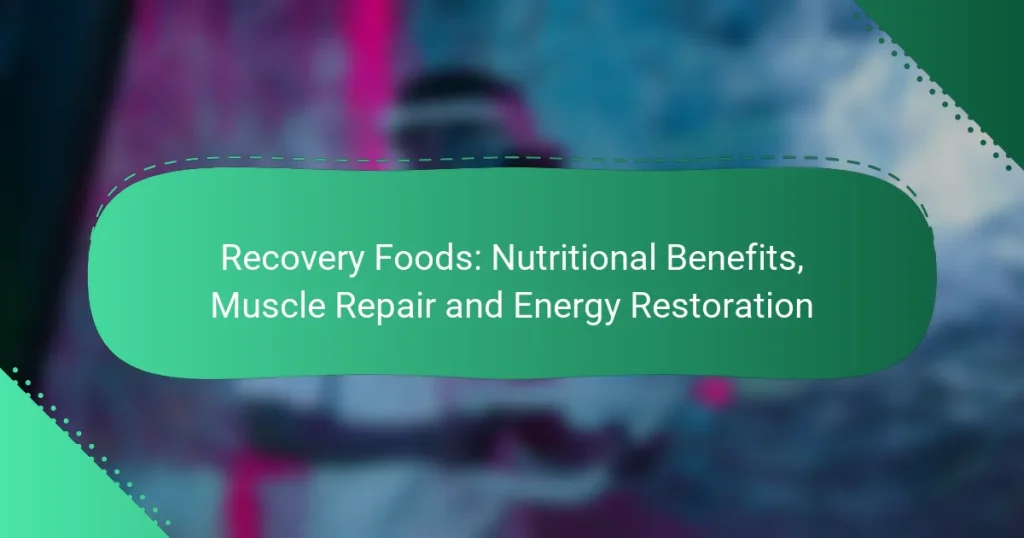Recovery foods are essential for athletes and active individuals, as they provide the necessary nutrients for muscle repair and energy restoration after physical activity. A balanced intake of protein, carbohydrates, healthy fats, and hydration helps replenish glycogen stores, reduce inflammation, and support overall recovery. Incorporating these foods into your post-exercise routine can significantly enhance performance in future workouts and competitions.

What Are the Best Recovery Foods for Muscle Repair?
The best recovery foods for muscle repair include a combination of protein-rich foods, carbohydrates, healthy fats, and adequate hydration. These components work together to support muscle recovery, replenish energy stores, and reduce inflammation after physical activity.
Protein-rich foods
Protein-rich foods are essential for muscle repair as they provide the amino acids necessary for rebuilding muscle tissue. Aim for sources like lean meats, fish, eggs, dairy products, legumes, and plant-based proteins. A general guideline is to consume around 20-30 grams of protein within 30 minutes after exercise for optimal recovery.
Consider incorporating foods like Greek yogurt, chicken breast, or a protein shake into your post-workout meal. These options not only support muscle repair but also help in reducing muscle soreness.
Carbohydrate sources
Carbohydrates are crucial for replenishing glycogen stores depleted during exercise. Foods such as whole grains, fruits, and starchy vegetables provide the necessary carbohydrates for recovery. A good target is to consume approximately 1-1.5 grams of carbohydrates per kilogram of body weight within a few hours post-exercise.
Examples include brown rice, quinoa, bananas, and sweet potatoes. Pairing carbohydrates with protein can enhance recovery, making meals like a turkey sandwich on whole-grain bread an excellent choice.
Healthy fats
Healthy fats play a role in reducing inflammation and supporting overall recovery. Sources such as avocados, nuts, seeds, and olive oil can be beneficial. While fats should not be the main focus immediately after exercise, including them in your meals can provide sustained energy and aid in nutrient absorption.
Incorporate healthy fats into your diet by adding a handful of almonds to your post-workout smoothie or drizzling olive oil over a salad. Aim for a balanced intake, ensuring fats complement your overall recovery nutrition.
Hydration options
Staying hydrated is vital for effective recovery, as fluids help transport nutrients and maintain muscle function. Water is the best option for hydration, but electrolyte-rich drinks can be beneficial after intense workouts. Aim to drink at least 500-750 ml of water within two hours post-exercise.
In addition to water, consider options like coconut water or sports drinks that contain electrolytes to replenish lost minerals. Monitor your hydration status by checking the color of your urine; pale yellow indicates proper hydration.

How Do Recovery Foods Aid in Energy Restoration?
Recovery foods play a crucial role in restoring energy levels after physical activity by replenishing glycogen stores and balancing electrolytes. These foods help athletes and active individuals recover more effectively, enabling them to perform better in subsequent workouts or competitions.
Glycogen replenishment
Glycogen replenishment is essential for restoring energy after exercise, particularly for endurance athletes. Consuming carbohydrates post-workout helps to replenish glycogen stores in the muscles and liver, which can become depleted during prolonged physical activity.
Aim for a carbohydrate intake of about 1.0 to 1.5 grams per kilogram of body weight within 30 minutes after exercise. Foods like bananas, rice, or sports drinks can be effective choices for quick glycogen restoration.
Electrolyte balance
Maintaining electrolyte balance is vital for optimal muscle function and hydration. Electrolytes, such as sodium, potassium, and magnesium, are lost through sweat during exercise and need to be replaced to prevent muscle cramps and fatigue.
Incorporating foods rich in electrolytes, like coconut water, pickles, or electrolyte-infused drinks, can help restore balance. Aim to consume these within a few hours post-exercise to support recovery and enhance performance in future workouts.

What Nutritional Benefits Do Recovery Foods Provide?
Recovery foods offer essential nutrients that aid in muscle repair, replenish energy stores, and support overall recovery after physical activity. These foods typically contain a balanced mix of vitamins, minerals, amino acids, and antioxidants that work together to enhance recovery processes.
Vitamins and minerals
Vitamins and minerals play a crucial role in recovery by supporting various bodily functions. Key vitamins such as vitamin C and vitamin E help reduce inflammation and promote healing, while minerals like magnesium and potassium are vital for muscle function and recovery.
Incorporating foods rich in these nutrients can significantly enhance recovery. For example, leafy greens, nuts, and fruits provide a good mix of vitamins and minerals that can be easily included in post-workout meals.
Amino acids
Amino acids are the building blocks of protein and are essential for muscle repair and growth. After exercise, consuming a source of amino acids, particularly branched-chain amino acids (BCAAs), can help reduce muscle soreness and accelerate recovery.
Foods such as lean meats, dairy products, and legumes are excellent sources of amino acids. Aim to include a protein-rich snack or meal within 30 to 60 minutes post-exercise to maximize recovery benefits.
Antioxidants
Antioxidants help combat oxidative stress caused by intense physical activity, which can lead to muscle fatigue and damage. Nutrients like vitamin C, vitamin E, and various phytochemicals found in fruits and vegetables can neutralize free radicals and support recovery.
Incorporating antioxidant-rich foods, such as berries, nuts, and dark chocolate, into your diet can enhance recovery. Aim for a colorful plate to ensure a diverse intake of these beneficial compounds.

How to Choose Recovery Foods for Optimal Results?
Selecting the right recovery foods is essential for enhancing muscle repair and restoring energy after physical activity. Focus on nutrient-rich options that align with your dietary preferences and timing needs to maximize recovery benefits.
Consider dietary preferences
Your dietary preferences play a crucial role in choosing recovery foods. Whether you follow a vegetarian, vegan, gluten-free, or omnivorous diet, ensure that your options provide the necessary nutrients for recovery. For instance, plant-based proteins like lentils and quinoa can be excellent choices for vegetarians.
Additionally, consider any food allergies or intolerances. Always read labels and opt for whole foods that fit your dietary restrictions while still delivering essential nutrients.
Evaluate nutrient density
Nutrient density refers to the amount of essential nutrients per calorie in a food. When selecting recovery foods, prioritize options that are high in protein, healthy fats, and carbohydrates while being low in empty calories. Foods like Greek yogurt, nuts, and sweet potatoes are nutrient-dense and support muscle recovery.
Aim for a balance of macronutrients. A common recommendation is to consume a meal or snack containing a 3:1 ratio of carbohydrates to protein within a few hours post-exercise to optimize recovery.
Assess timing of intake
The timing of your recovery food intake can significantly impact muscle repair and energy restoration. Consuming recovery foods within 30 to 60 minutes after exercise is ideal for replenishing glycogen stores and aiding muscle recovery. This is often referred to as the “anabolic window.”
Plan your meals and snacks around your workout schedule. If you exercise regularly, keep portable recovery snacks, such as protein bars or smoothies, on hand to ensure you meet your nutritional needs promptly after workouts.

What Role Do Supplements Play in Recovery?
Supplements can significantly enhance recovery by providing essential nutrients that support muscle repair and energy restoration. They help replenish what the body loses during intense physical activity, making it easier to bounce back and prepare for the next workout.
Protein powders
Protein powders are a popular supplement for muscle recovery, as they provide a concentrated source of protein that aids in muscle repair and growth. Common types include whey, casein, and plant-based proteins, each offering unique benefits depending on dietary preferences and needs.
For effective recovery, aim for a protein intake of about 20-30 grams within 30 minutes post-exercise. This can be easily achieved with a protein shake or by incorporating protein-rich foods like Greek yogurt or cottage cheese into your post-workout meal.
Electrolyte drinks
Electrolyte drinks help restore hydration and balance essential minerals lost through sweat during exercise. These drinks typically contain sodium, potassium, magnesium, and calcium, which are crucial for muscle function and preventing cramps.
When choosing an electrolyte drink, look for options with low sugar content and a balanced ratio of electrolytes. Consuming these drinks during or after prolonged workouts can enhance recovery and maintain optimal performance levels. Aim for about 500-700 mg of sodium per liter of fluid consumed during intense exercise sessions.

